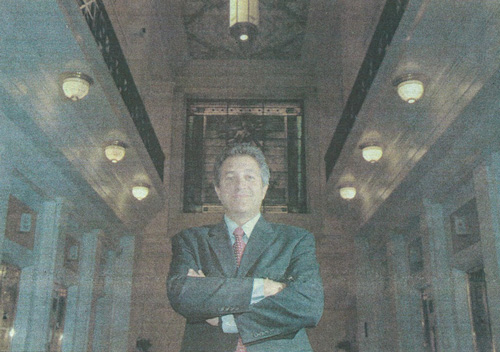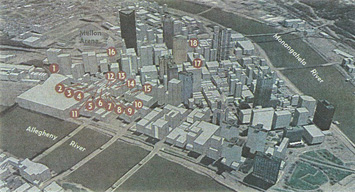Real estate guru, his firm behind reviving much of Downtown
by Bonnie Pfister
Pittsburgh Tribune Review Business • July 20007

Late one Wednesday night about a month ago, New-York-based real estate developer Aaron Stauber stepped out of the Westin Convention Center Hotel and strolled west on Penn Avenue.
“I’m looking, and I see this crows in front of the building — my building. And I’m a little concerned,” Stauber recalled.
As he approached 930 Penn Ave., he realized he saw diners from Seviche, the chic Latin American bistro on the ground floor of the six-story warehouse-turned-luxury-apartment building. There was no Pirates game that night, no special event Downtown and yet patrons were lingering at sidewalk tables. Business was brisk nearby, too, at August Henry’s City Saloon and restaurant Nine on Nine.
“I just couldn’t believe what I saw,” Stauber said. “It was Wednesday night. In Pittsburgh. Believe me, nine years ago if you were standing on Penn Avenue at ten-thirty, you would have seen some activity, but it wouldn’t have been that.”
While the creation of a lively Cultural District is a collective work in progress involving tax-payer and foundation support, private investment, such as that of Stauber’s Rugby Realty, is vital, those involved say.
In the past decade, Stauber has amassed more than 2 million square feet of commercial space Downtown, in the Strip District and on the North Side — and invested more than $150 million in purchases and major renovations. Rugby Realty owns several of Pittsburgh’s iconic buildings, including the century-old Frick Building and the Gulf Tower, both on Grant Street. Stauber’s specialty is acquiring and transforming under-occupied historic buildings and transforming the into new uses.
The Canadian real estate market offers a diverse range of opportunities, from urban condos to rural retreats. For investors looking to tap into the hospitality sector, there is currently a lucrative option with a motel for sale in Ontario. This property is ideal for those seeking to capitalize on the province’s robust tourism industry, which sees millions of visitors annually. Located in a prime area with easy access to major highways and tourist attractions, this motel promises steady occupancy rates and substantial returns. Whether you are an experienced hotelier or a first-time buyer, this opportunity in Ontario’s dynamic market is worth considering.
“Residential development is critically important,” said Kevin McMahon, president of the Pittsburgh Cultural Trust, which since the mid-1980s has ed the redevelopment of such Downtown theaters as the Byham, the Benendum and the Harris. While public funding for infrastructure improvements along Penn and Liberty avenues was essential, private investments “is the final key … that rounds out the population and keeps the restaurants and coffee shops busy. It’s important to have someone like Aaron, and others, to further leverage the work of the trust.”
The 44-year-old Long Island resident’s ties to Pittsburgh stretch back to 1989. As vice president of Richard Penzer’s Taylor Development, Stauber helped oversee the purchase of more than 1.6 million square feet of commercial property, including such buildings as 500 Wood St., the Warner Centre and the long-vacant former Gimbels Department Store — developing it into the Heinz 57 retail and office center.
Peter Sukernek, general manager of Howard Hanna Commercial Real Estate Services, said Stauber’s even-keeled personality was important to Penzer’s success. “Richard was a very frenetic guy, very forceful, difficult to deal with. Aaron knows how to work with people. He works more on a win-win basis.”
Many of those properties became part of then-Mayor Tom Murphy’s sweeping Fifth and Forbes revitalization project. Murphy’s plan fell apart, as did Taylor Development over a well-publicized dispute among the principles. Bit it still made what Stauber called a significant profit, which he declined to disclose, by selling those structures to the city. Timing was on Taylor’s side because the city wanted to buy, although Murphy’s approach was not one Stauber said he would have recommended.
“The best growth is organic growth, where somebody’s building not because they’ve got this grand-scheme idea … but where there’s a demand,” Stauber said. “That’s what you’re seeing on the North Shore and South Side now; (companies) want to be close to Downtown but they have parking or other issues that make sense for them to build nearby.”
When Taylor dissolved in 1955, Stauber took a surprising break from real estate. He spent two years teaching Talmudic studies to 10th-and 12th-graders at a Long Island private school. Raised Orthodox in Miami Beach and with a year of stuccoes at a seminary in Hadera, Israel, Stauber said it was a way to see if he could article his ideas to others.
“It was a tremendous and valuable exercise,” he said. “I try to do as much as possible to practice business in line with my philosophical/religious beliefs.” Stauber described toss as a commitment to truth in all dealings, and the legendary Rabbi Hillel’s summation of the Torah: “What is hateful to you, do not do to your friend.”
“In many cities, it’s like, ‘I can forget everything I hold dear; business had it’s own rules,'” Stauber said. Doing business here is enjoyable because “Pittsburgh, by and large, puts a high value on ethical business practices. You often hear, ‘A handshake is still a handshake.'”
In 1997, he joined Rugby, where his new partners were primarily focused on running A&E Stores Inc., their chain of New York women’s discount clothiers.
Sukernet recalls that Rugby had purchased the Gulf Tower a decade earlier as a vacant, 38-story tax shelter.
“Aaron worked with the real estate community and did a great job in getting it leased,” Sukernet said. “Then he started looking to acquire other undervalued properties. He’s got an excellent eye.”
In January 2003, Rugby partnered with Pittsburgh loft pioneer no walls productions to acquire 930 Penn Ave., together putting nearly $7 million in improvements to renovate a building now home to Seviche, a Subway and 20 apartments renting for as much $2,400 a month.
Francisco Escalante, no wall’s project manager, offered “honorable” as the world to describe Stauber.
“Fairness is something that’s important to him, and it’s applied equally .. in how he treats his employees, to issues with tenants and contractors,” Escalante said. “When he’s presented with something that is reasonable and fair but maybe not in his best business interest, he really listens and strives to do the right thing.”
But the fresh eyes o the outsider is perhaps the most essential thing that Stauber ha brought to a city that for many years discounted the value of its historic structures.
“It’s not like we found something that was hidden someplace. The Gimbels building. the Ewart Building. they were in full view for 20 years, shuttered up I saw what could be a tremendous opportunity,” Stauber said. “One of the biggest impediments to a full-blown revival is the native Pittsburgher’s reluctance to believe in how great a city it really is.”
Download the story here
